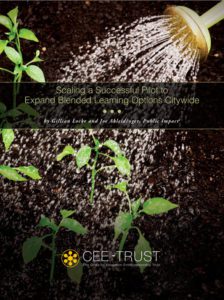In A Better Blend, we explained how schools can boost student outcomes from digital learning by combining it with staffing models that allow excellent teachers to both reach more students and help good teachers excel. Digital learning holds great promise—but only if we combine its power to personalize learning with the power of excellent teaching.
What else could increase the chances of high-quality technology use in our schools? Public Impact® has written two reports out this week for CEE-Trust (the Cities for Education Entrepreneurship Trust) showing how city-based funders and reformers can help, by catalyzing and scaling up high-quality blended learning in their cities.

Interventions and Catalysts in Markets for Education Technology: Roles of City-Based Funders acknowledges the significant roles funders can have in realizing technology’s potential in schools. It catalogs activities within education technology markets that city-based funders might support, and how they might support them. Written by Joe Ableidinger, this report shows how funders may intervene directly in education technology markets by funding creators or users of promising technology, or catalyze activity by:
- connecting creators and users
- networking market participants
- conducting research on what works
- publicizing activities of market participants
- vetting or aggregating education technology options
- educating and supporting investors
- coordinating policy or advocacy initiatives, and
- supporting implementation.
Don’t miss the handy appendix of the four most frequently asked questions Ableidinger heard from city-based funders, with answers drawn from the report:
- How do we build more interest and understanding of high-quality blended learning in our city?
- How can we increase the number of high-quality blended learning schools?
- How can we get more effective technology into public schools?
- How can we create the right conditions for blended learning in our city and state?

In the second report, Scaling a Successful Pilot to Expand Blended Learning Options Citywide, Public Impact®’s Gillian Locke and Joe Ableidinger look at how pioneering city-based organizations that have helped develop and implement successful blended learning initiatives can scale them up. This report details four approaches:
- Expand blended learning to additional schools and classrooms. Replicate successful models in additional schools and classrooms, and extend pilots to continue experimentation with new models.
- Develop systems and talent for scale. Build out the information technology, human capital, financial, and operational infrastructure necessary to fuel and sustain expanding blended learning initiatives.
- Advocate for policies that support expansion of high-quality blended learning initiatives. Provoke action by networking key stakeholders, drafting policy briefs and other documents to educate and influence policymakers, and generating positive media exposure for successful efforts.
- Amplify the voices of educators in efforts to influence policy and practice. Give teachers the support and resources they need to lead collaborations with their peers and hold public conversations about changes to existing policy and practice grounded in their experiences with blended learning initiatives.
The authors provide a list of suggested strategies to use for each approach. Each could be used alone, but Locke and Ableidinger suggest combining elements of all of them for the greatest chance of success. For example, expanding blended learning programs will require both improved systems and policy changes to succeed on a larger scale.
Note: Public Impact® and Opportunity Culture® are registered trademarks.
